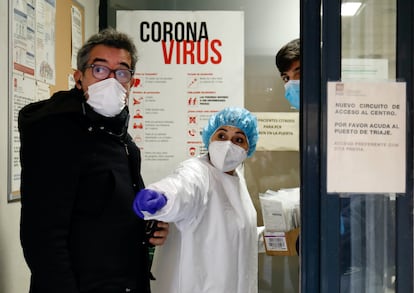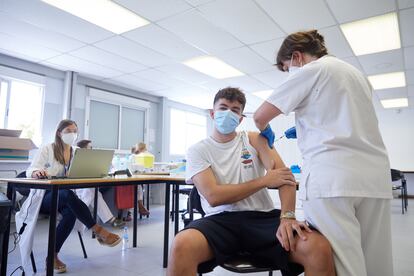Spain registers record number of coronavirus infections in pandemic so far, with 49,823 cases
The Public Health Commission agrees that vaccinated close contacts will not have to quarantine for 10 days, but they will have to limit their activities to just the essential


The coronavirus pandemic continues to spin out of control in Spain and yesterday saw a record number of cases in a day during the entire health crisis so far. The Health Ministry reported 49,823 new infections on Tuesday, a figure that has not been seen since the authorities began to collate trustworthy data – when the virus first began to circulate in March 2020, the accounting of cases was highly irregular. Until now, the previous high was recorded in January, in the midst of the third wave, when new infections reached 44,357 on January 21.
Just ahead of the Christmas holidays, Spain is currently in the midst of a new wave with the 14-day incidence through the roof, at 695 cases per 100,000 inhabitants according to Tuesday’s report. This figure has risen 68% in just a week.
The political debate is ongoing as to whether new restrictions should be implemented. Prime Minister Pedro Sánchez of the Socialist Party (PSOE) announced on Sunday that he would be meeting today with the regional premiers – Spain’s regions are in charge of their own restrictions, vaccine drives and healthcare systems – to “evaluate” new actions that can be taken to slow the spread of the virus. For now, only Catalonia has moved to tighten up measures, with plans for a new curfew and the closure of nightlife venues.
With soaring infections and the pressure on the country’s healthcare systems on the rise, medical professionals are calling for measures to contain the spread of the virus. But apart from the Catalan authorities, no other region is yet to back stricter measures in their territories. Some territories, such as the Basque Country, have voiced their support for the return of obligatory mask use when outside, but nothing more drastic than that. Regional premiers will be exchanging ideas at their scheduled meeting today, which will be held via videoconferencing from the upper house of parliament, the Senate.
According to Tuesday’s report, Navarre, Aragón, La Rioja and the Basque Country have the highest incidence, in excess of 1,000 cases per 100,000 inhabitants over 14 days. All the regions, however, are seeing high rates of new cases. Madrid, for example, set a new record on Tuesday with 11,221 infections reported in a day, the highest of the pandemic so far. The Health Ministry also added 94 deaths to the overall total, which now stands at 88,887.
Pressure on hospitals is also rising, albeit at a slower rate than infections. In total, there are 7,634 people being treated in hospital with Covid-19, which is 20% up on last week. Of these, there are 1,472 in intensive care units (ICUs), which is 21% up on a week ago.
These figures, for now, are far from the data seen at the peak of the third wave, at the end of January, when there were as many as 30,000 people hospitalized with Covid-19 and nearly 5,000 people in ICUs. Catalonia, with 662 infections per 100,000 inhabitants over 14 days, is currently the region with the highest pressure on its hospitals. Thirty percent of ICU beds are occupied by Covid patients – 386 patients in total. There are seven other regions that have broken the 20% barrier, while the North African exclave city of Melilla is in excess of 35%.
What we want is to administer third doses because protection against transmission is fadingSalvador Pieró, epidemiologist from the Fisabio research foundation
Despite the spike in infections, and the spread of the omicron variant – which is thought to be much more transmissible and with certain resistance to the vaccines – the Public Health Commission agreed on Tuesday that fully vaccinated close contacts of cases would not have to observe a 10-day quarantine. Until now, the Health Ministry protocol stated that if a close contact was vaccinated, they would only have to isolate should they have a suppressed immune system or if they had come into contact with someone infected by the omicron, beta or gamma variant.
This update to the protocol will limit obligatory quarantine just to unvaccinated contacts and people with suppressed immune systems or contacts with the beta or gamma variants (these strains are not widely circulating in Spain).
The decision taken by the Public Health Commission is in stark contrast to that adopted by the Catalan authorities, which last week announced that from this Thursday, all close contacts of a case would have to quarantine regardless of their vaccination status, and that no tests would be carried out apart from in the case of symptoms.
This measure is not being rolled out to the rest of Spain, and according to the Health Ministry, the Commission voted “by a majority” for vaccinated contacts not to have to isolate. The advice will, however, be for people in this situation to limit their activities just to the essential, reducing social interactions to a minimum.
For Salvador Pieró, an epidemiologist from the Fisabio research foundation in Valencia, the decision made by the Commission “makes no sense” from an epidemiological point of view. “Above all, given we are seeing an endless stream of infections among vaccinated people,” he explains.
“There is a reasonable argument that we don’t want to create confusion with the effects of the vaccines,” he continues. “But the time for appealing to the unvaccinated has passed and what we want is to administer third doses because protection against transmission is fading, albeit not against serious illness or death.”
Another argument in favor of the decision is more economic, he adds. “If you isolate people now there will be a lot of problems in a lot of sectors. And now, close contacts will not be given medical leave because they are not isolated. If they quarantine, that medical leave must be paid for by the Social Security system.”
In its latest risk assessment, the Health Ministry believes that the risk of the spread of the omicron variant is “very high,” as is the effect that it will have on the population.

The Health Ministry has, as a result, raised the risk value from the beginning of the month, when just six cases of the new strain had been reported and the risk of spread was classed at “high.” It is also recommending “establishing limits for the number of participants in public events.” During the Christmas holidays, the ministry document also recommends “limiting social meetings with family members and friends, meals and company parties, as well as public events where there may be crowds.”
In Spain, genomic sequencing has confirmed imported omicron cases from South Africa as well as cases associated with community transmission. In fact, omicron cases have spiked in recent weeks and with very preliminary data from the regions, the last ministry report stated that 47% of samples sequenced during the week of December 6 to 12 are omicron.
The Health Ministry report also recommends accelerating the administration of a booster shot of Covid-19 vaccines. According to preliminary studies in the United Kingdom, the effectiveness of the vaccine against omicron is lower than with the delta strain, which is currently dominant. A booster shot raises this effectiveness from below 40% 15 weeks after the second dose, to 75% 15 days after the third dose.
In Spain, where some 80% of the entire population is fully vaccinated, more than 11 million booster shots have already been administered. Among the over-60s, 74% have received this extra dose, as well as 54% of those who were originally given the single-shot Janssen medication during the original vaccination campaign.
The Public Health Commission last week approved the booster shot for the over-40s, while elsewhere the campaign is already focussing on children aged five to 11 years old. In less than a week, 13.4% of the 3.3 million children in Spain have already got their first shot of the Pfizer-BioNTech pediatric vaccine.
According to La Moncloa, the prime ministerial palace, today’s meeting of regional premiers is aimed at tackling “the situation caused by Covid and strengthening co-governance and institutional cooperation.” For now, there is no apparent political will to approve restrictions for the country as a whole and the regions will be left in charge of handling the crisis.
Sources from the central government say that there are no current plans to implement an emergency situation once more, such as the state of alarm that was put in place in 2020 and gave the government powers to order home lockdowns, among other measures. Nor will there be any limits put on mobility for now, something that will be a key factor in people’s Christmas plans. The prime minister does, however, want to find consensus in order to agree on ways to tackle this new wave with some extra restrictions.
For now, most of the country’s regions are ruling out any new limits on opening times or capacity for venues such as bars and nightclubs. Five regions are today planning to back masks when outdoors, given the large crowds that form during the holiday season in city centers.
The Catalan premier, Pere Aragonès, is calling for the measures he will be putting in place – provided they get the blessing of the courts – to be rolled out nationwide in order to guarantee their success and to stem the spread of the omicron variant.
Tu suscripción se está usando en otro dispositivo
¿Quieres añadir otro usuario a tu suscripción?
Si continúas leyendo en este dispositivo, no se podrá leer en el otro.
FlechaTu suscripción se está usando en otro dispositivo y solo puedes acceder a EL PAÍS desde un dispositivo a la vez.
Si quieres compartir tu cuenta, cambia tu suscripción a la modalidad Premium, así podrás añadir otro usuario. Cada uno accederá con su propia cuenta de email, lo que os permitirá personalizar vuestra experiencia en EL PAÍS.
¿Tienes una suscripción de empresa? Accede aquí para contratar más cuentas.
En el caso de no saber quién está usando tu cuenta, te recomendamos cambiar tu contraseña aquí.
Si decides continuar compartiendo tu cuenta, este mensaje se mostrará en tu dispositivo y en el de la otra persona que está usando tu cuenta de forma indefinida, afectando a tu experiencia de lectura. Puedes consultar aquí los términos y condiciones de la suscripción digital.








































